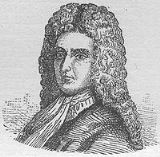
, who gained fame for his novel Robinson Crusoe
. Defoe is notable for being one of the earliest proponents of the novel
, as he helped to popularise the form in Britain and along with others such as Richardson
, is among the founders of the English novel
. A prolific and versatile writer, he wrote more than 500 books, pamphlets and journals on various topics (including politics, crime, religion, marriage, psychology and the supernatural).
Alas the Church of England! What with Popery on one hand, and schismatics on the other, how has she been crucified between two thieves!![]()
Reason, it is true, is DICTATOR in the Society of Mankind; from her there ought to lie no Appeal; But here we want a Pope in our Philosophy, to be the infallible Judge of what is or is not Reason.![]()
All men would be tyrants if they could.![]()
The best of men cannot suspend their fate:The good die early, and the bad die late.![]()
'Tis very strange Men should be so fond of being thought wickeder than they are.![]()
Wherever God erects a house of prayer,The Devil always builds a chapel there;And 'twill be found, upon examination,The latter has the largest congregation. ![]()
From this amphibious ill-born mob beganThat vain, ill-natured thing, an Englishman.![]()
The royal refugee our breed restoresWith foreign courtiers and with foreign whores,And carefully repeopled us again,Throughout his lazy, long, lascivious reign.![]()
Wealth, howsoever got, in England makesLords of mechanics, gentlemen of rakes;Antiquity and birth are needless here;‘Tis impudence and money makes a peer.![]()
Great families of yesterday we show,And lords whose parents were the Lord knows who.![]()

